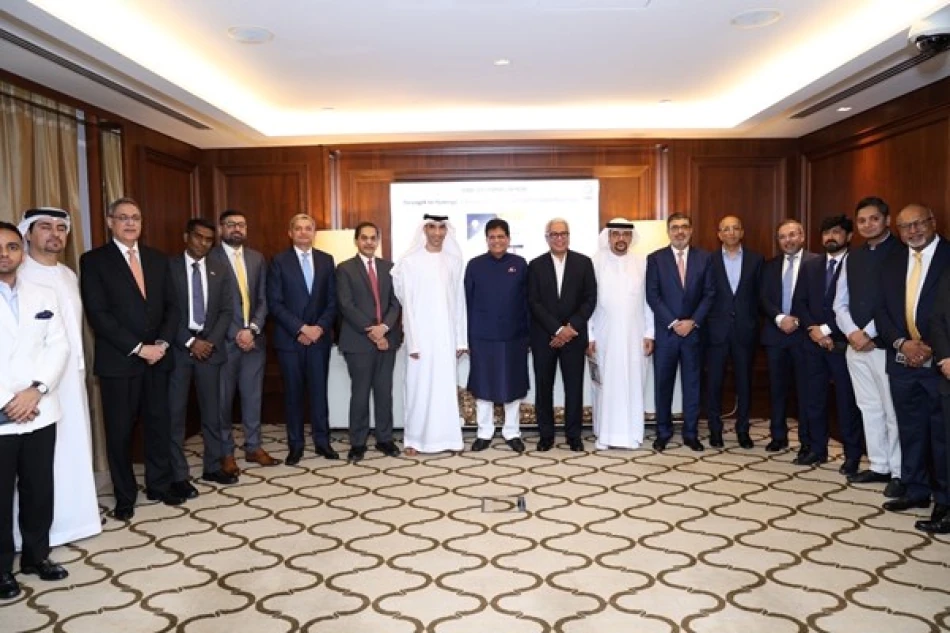
Forging Economic Partnership: UAE and India Launch 'Strength in Synergy' Initiative
UAE-India Trade Partnership Hits $37.6 Billion as Strategic Alliance Reshapes Global Commerce
The UAE-India Comprehensive Economic Partnership Agreement (CEPA) has evolved far beyond a traditional trade deal, generating record-breaking non-oil trade worth $37.6 billion in the first half of 2025—a 33.9% surge that positions both nations as architects of a new model for international economic cooperation. This partnership now serves as a strategic platform attracting Indian high-net-worth individuals and family offices to the UAE while expanding into emerging sectors like artificial intelligence and space technology.
Record Trade Growth Signals Economic Transformation
The UAE-India Business Council launched its "Strength in Synergy" initiative during a high-level meeting attended by UAE Minister of State for Foreign Trade Dr. Thani bin Ahmed Al Zeyoudi and India's Commerce and Industry Minister Piyush Goyal. The gathering highlighted how CEPA has transcended its original scope, driving unprecedented growth across traditional sectors including gems and jewelry, food manufacturing, telecommunications, green energy, and digital services.
This 33.9% growth rate significantly outpaces global trade expansion, which has struggled to maintain momentum amid geopolitical tensions and supply chain disruptions. The performance demonstrates how targeted bilateral agreements can create resilient trade corridors even in volatile international markets.
Strategic Sectors Drive Future Cooperation
Emerging Technology Integration
The partnership is expanding into cutting-edge sectors that will define the next decade of global commerce. Artificial intelligence collaboration between UAE's tech hubs and India's software expertise creates a formidable combination, while space technology cooperation leverages the UAE's Mars mission success alongside India's cost-effective satellite launch capabilities.
Financial Integration and Investment Flows
The UAE has become the preferred investment destination for Indian high-net-worth individuals and family offices, a trend that mirrors Singapore's success in attracting Asian wealth. This financial integration supports strategic joint projects and reinforces the UAE's position as a global investment center, competing directly with traditional hubs like Switzerland and Hong Kong.
Global Economic Leadership Ambitions
Faisal Kottikollon, Chairman of the UAE-India Business Council, emphasized that CEPA has transformed from a trade framework into a comprehensive strategic platform reflecting both nations' vision for innovation-based global cooperation. The initiative provides policymakers and investors with a roadmap for expanding collaboration in clean energy, education, scientific research, and digital integration.
This approach positions the UAE-India partnership as a counter-narrative to protectionist trends seen in US-China trade relations and Brexit-related disruptions in Europe. Instead of building walls, both countries are creating bridges that facilitate smoother capital, technology, and talent flows.
Multilateral Influence and Global Corridors
The research paper accompanying the initiative highlights both countries' pivotal roles in multilateral forums including the G20, BRICS, and the India-Middle East-Europe Economic Corridor. This corridor project, announced at the 2023 G20 summit, could reshape global trade routes by providing an alternative to China's Belt and Road Initiative.
The UAE's strategic location and India's manufacturing capabilities create a natural partnership for this corridor, potentially reducing shipping times between Asia and Europe while establishing new trade hubs across the Middle East.
Market Implications and Investment Outlook
For investors, this partnership signals several key opportunities. The 33.9% trade growth rate suggests continued momentum in bilateral business ventures, while the focus on emerging technologies indicates where future value creation will occur. Companies operating in clean energy, digital services, and space technology should consider the UAE-India corridor as a growth platform.
The emphasis on sustainability and green energy cooperation also aligns with global ESG investment trends, making this partnership attractive to international funds seeking exposure to climate-focused growth stories. As both countries advance their net-zero commitments, their collaboration could produce scalable solutions for global markets.
Most Viewed News

 Layla Al Mansoori
Layla Al Mansoori






